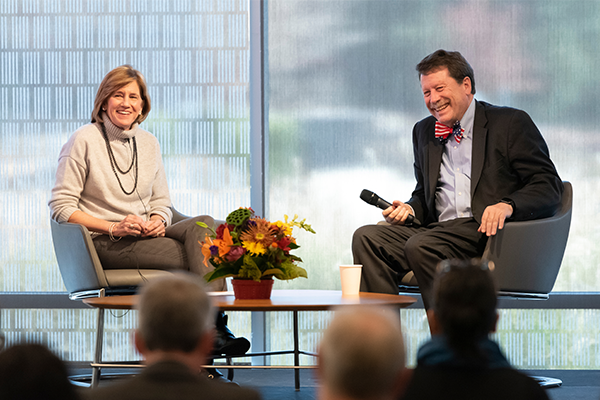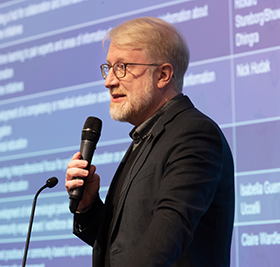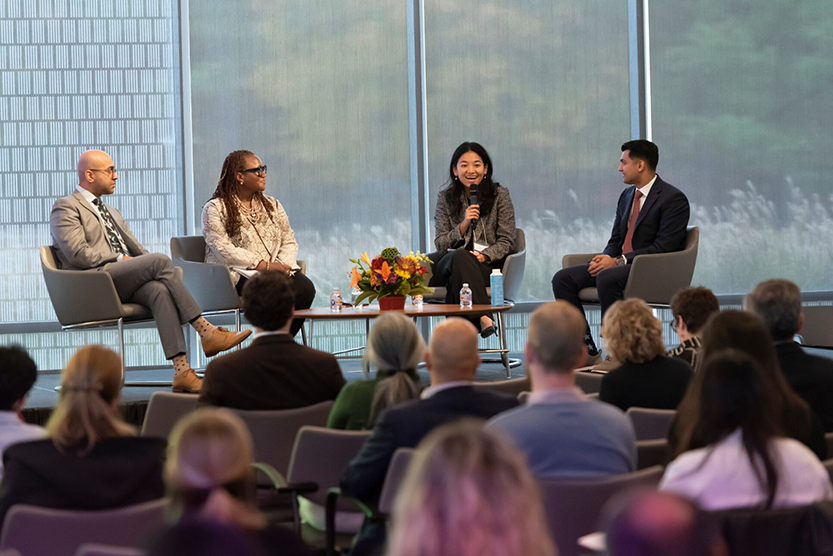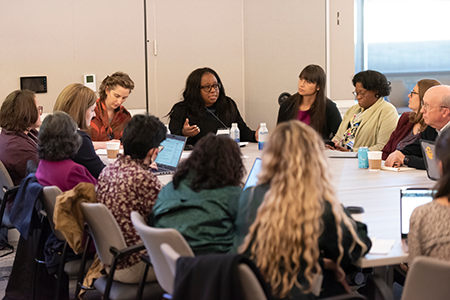
On November 16 and 17, a group of experts spanning the fields of medicine, public health, social science, communication, and technology met in Research Triangle Park to discuss one of the most difficult challenges facing health care in the United States today. The problem they gathered to confront was not a virus or cancer, but a very 21st-century threat: our national epidemic of misinformation.
“Health misinformation is a threat to public and individual health that we cannot afford to ignore,” said conference organizer Brian Southwell, PhD, an adjunct professor in the Department of Medicine at Duke and lead scientist for public understanding of science at RTI International. “But while there has been an increase in awareness about misinformation and how it spreads, what we really need now are evidence-based approaches that allow us to counter it effectively at scale while also respecting the experiences and perspectives of patients. That’s what the network we are building will start to address.”

The conference, billed as a “National Forum on Best Practices to Address Health Misinformation,” took place amid growing concern about negative U.S. health trends. Recent data reveal falling rates of vaccination for preventable childhood diseases, concerns about trust in science and scientists in the wake of the COVID-19 pandemic, and an ongoing and alarming downward trend in U.S. life expectancy. And while misinformation is not the sole factor driving these outcomes, it has emerged as an important contributing factor.
“We know that medical misinformation, in very real ways, costs lives,” said F. Joseph McClernon, PhD, a professor in the Duke Department of Psychiatry and associate director of the Duke Clinical and Translational Science Institute.
The two-day forum was jointly hosted by nonprofit research organization RTI International, Duke University School of Medicine, the Duke Clinical and Translational Science Institute, and the Coalition for Trust in Health and Science. Participants explored promising approaches for bolstering the quality of the medical “information environment” and equipping health care professionals to better deal with the challenges of misinformation in patient care settings. RTI International’s president and chief executive officer welcomed participants to the event held at RTI’s Research Triangle Park headquarters.
“Getting this right is critical to all of our missions,” said Mary Klotman, MD, Duke University’s executive vice president for health affairs and dean of the School of Medicine. “Collaboration around tough issues is how we move the needle in a positive direction. What better opportunity than to educate on how to communicate?”

The vital role of communication in countering misinformation was reflected in the forum’s plenary sessions, which presented findings from pilot studies aimed at uplifting credible health information online, improving medical education to equip health care providers with tools needed to communicate effectively with patients, and strategies for intervening to counter the effects of misinformation. Many of the speakers acknowledged that they face an uneven playing field when it comes to intervening against medical misinformation.
“People are awake for about six thousand hours a year; they may spend two or three hours in a doctor’s office annually,” sad Council of Medical Specialty Societies CEO Helen Burstin, MD, MPH, who likened efforts to counter misinformation to tending a garden. “You can spend all day pulling weeds, but the work is endless, and it is not enough. You also have to plant seeds of high-quality information.”
Plenary sessions were punctuated by moderated brainstorming sessions focused on improving communication about health and health care and countering potentially harmful misunderstandings or falsehoods. Forum attendees learned about wide-ranging approaches, from artificial intelligence-assisted solutions capable of curating trustworthy sources of information to initiatives aimed at identifying and overcoming sources of mistrust in science and medicine.

Another theme that emerged centered on the fact that while misinformation often has local characteristics that resist easy solutions, the power of storytelling and narrative are key to bridging gaps in experience and understanding. At the same time, speakers noted that until recently, training in effective communication and evidence-based interventions to counter misinformation has not been part of education for physicians or other medical staff. However, there is a growing realization that the entire health care team – doctors, nurses, administrative and technical staff, and housekeeping – all have critical roles to play.
The second day of the conference featured a “fireside chat” between Klotman and Food and Drug Administration Commissioner Robert Califf, MD, former director of the Duke Clinical Research Institute, in which they discussed potential paths forward and the roles that academia and government can play in improving health literacy and communication about health-related concerns. Sounding a note of optimism, Klotman reminded the audience that patients themselves can be essential partners for health care professionals seeking better ways to talk about health issues.
“Patients are coming in with passion and want to be advocates,” she said, but expanding an already crowded curriculum with a discrete course might be difficult. However, incorporating communication skills throughout the medical curriculum may achieve even better outcomes. Califf agreed but noted that it was time to make the case for communication skills as an essential part of a health professional’s toolkit.
“If you’re trying to improve people’s health, it’s hard to argue that it’s not essential,” he responded, adding that a “north star” for such efforts could center on the shared understanding that everyone wants to live a long and healthy life.
This sentiment echoed a call to action offered at the conference’s opening by Reed Tuckson, MD, of Tuckson Health Connections and the Coalition for Trust in Health and Science, who noted that the entire health ecosystem has a role to play in protecting patients and communities from the harmful impacts of health misinformation.
“Organizations have made a statement of courage,” said Tuckson. “We are still alive enough to care.”